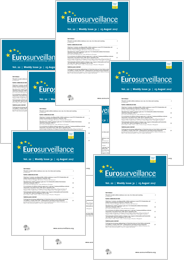- Home
- Weekly releases (1997–2007)
- Previous Issues
- Volume 7, Issue 19, 08/May/2003
Weekly releases (1997–2007) - Volume 7, Issue 19, 08 May 2003
Volume 7, Issue 19, 2003
- Articles
-
-
-
New data on clinical features, incubation period, and case fatality rate of SARS in Hong Kong and Canada
More LessNew findings arising from the outbreaks of severe acute respiratory syndrome (SARS) in Hong Kong and Canada have been reported in two early online publications (1, 2). The authors of the Hong Kong paper used demographic, epidemiological, and clinical data from 1425 SARS cases reported up to 28 April to describe the epidemic in Hong Kong and to estimate key epidemiological parameters. The paper from Canada reviews the clinical features and outcomes of 144 SARS patients admitted to hospital between 7 March and 10 April in Toronto.
-
-
-
Criteria for removing WHO travel warnings in relation to SARS - outcome of discussions between Hong Kong and World Health Organization
More LessDuring a videoconference between Geneva and Hong Kong on 6 May, the World Health Organization (WHO) thanked the Hong Kong Secretary for Health, Welfare and Food for Hong Kong's continuing efforts at containing severe acute respiratory syndrome (SARS). WHO thanked the Health Secretary in particular for allowing a Malaysian ship to enter the port recently with suspected SARS cases on board.
-
-
-
Vaccination catch-up campaign in response to recent increase in invasive Hib infection in the United Kingdom – implications for the rest of Europe?
More LessA catch-up immunisation campaign against Haemophilus influenzae type b (Hib) is scheduled to commence in England and Wales in the second week of May (http://www.doh.gov.uk/cmo/letters/cmo0301.htm). This decision has been made in response to a recent increase in invasive infections due to this organism, with 145 cases of confirmed Hib disease reported in children under five in England and Wales last year. While this is still far lower than the 773 cases observed in this age group in 1990, before routine immunisation was implemented, it is a dramatic rise from the nadir of 22 in 1998 (1). To the end of 2001, surveillance in several European Union (EU) countries indicated that this experience was unique to the United Kingdom (UK) (http://www.phls.org.uk/inter/eu_ibis/aims.htm). A more recent report of a rise in cases in the Netherlands in 2002 is cause for concern (2).
-
-
-
Marked increase of positive HIV test results in Switzerland
More LessAnonymous reporting of positive HIV test results by laboratories performing the confirmation of the result is compulsory in Switzerland. Such laboratories reported 792 positive HIV test results performed in 2002 to the Swiss Federal Office of Public Health, representing an increase of 25% over the previous year, and confirming the reversal of a declining trend observed during most of the last decade (1).
-
-
-
European Commission and WHO discuss enhanced cooperation in the control of communicable disease
More LessThe importance of communicable disease control and health security, and in particular the establishment of a European centre for disease prevention and control, were stressed this week in a high level meeting between European Commissioners and the World Health Organization (WHO).
-
-
-
New edition of International Travel and Health from WHO, 2003
More LessThe 2003 edition of the World Health Organization (WHO) publication International Travel and Health, has now been published. It is available online at www.who.int/ith, or can be ordered from http://bookorders.who.int.
-
-
Most Read This Month

-
-
Chikungunya in north-eastern Italy: a summing up of the outbreak
R Angelini , A C Finarelli , P Angelini , C Po , K Petropulacos , G Silvi , P Macini , C Fortuna , G Venturi , F Magurano , C Fiorentini , A Marchi , E Benedetti , P Bucci , S Boros , R Romi , G Majori , M G Ciufolini , L Nicoletti , G Rezza and A Cassone
-
- More Less


